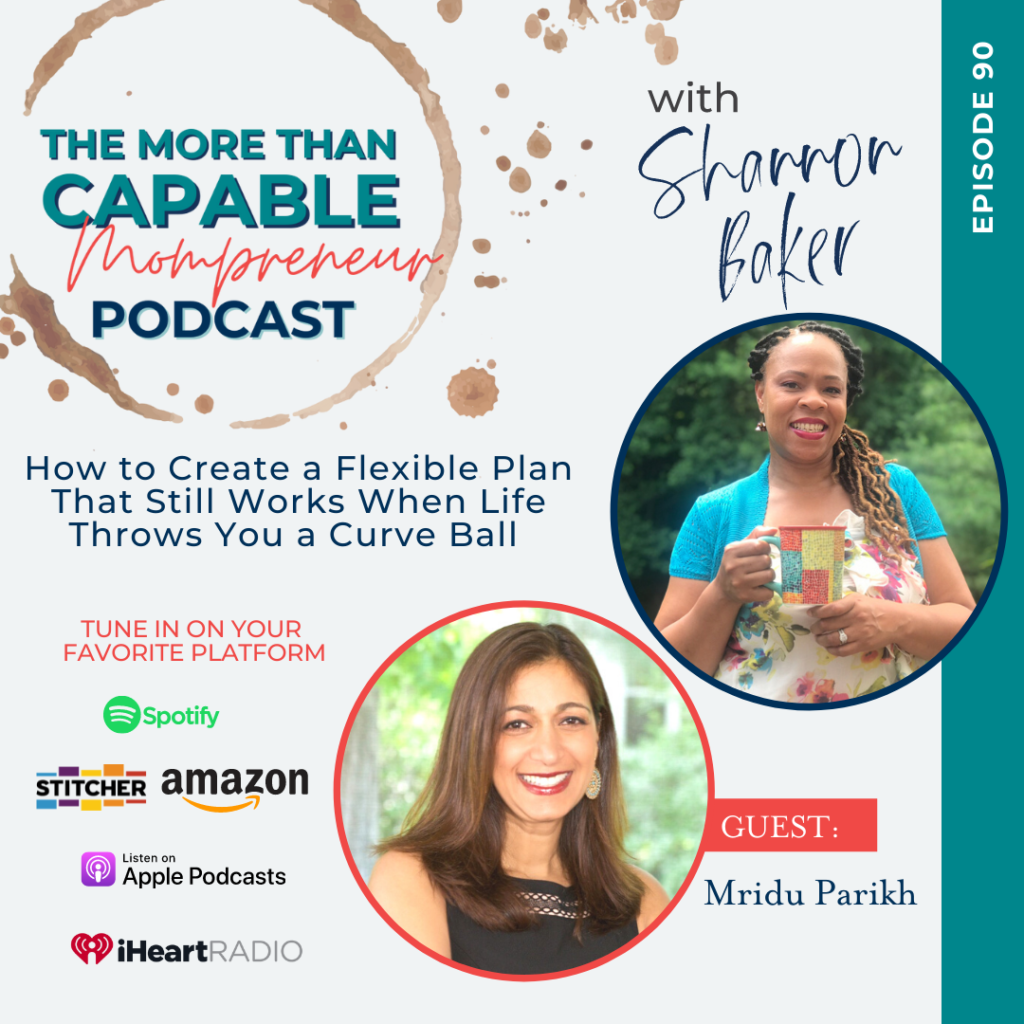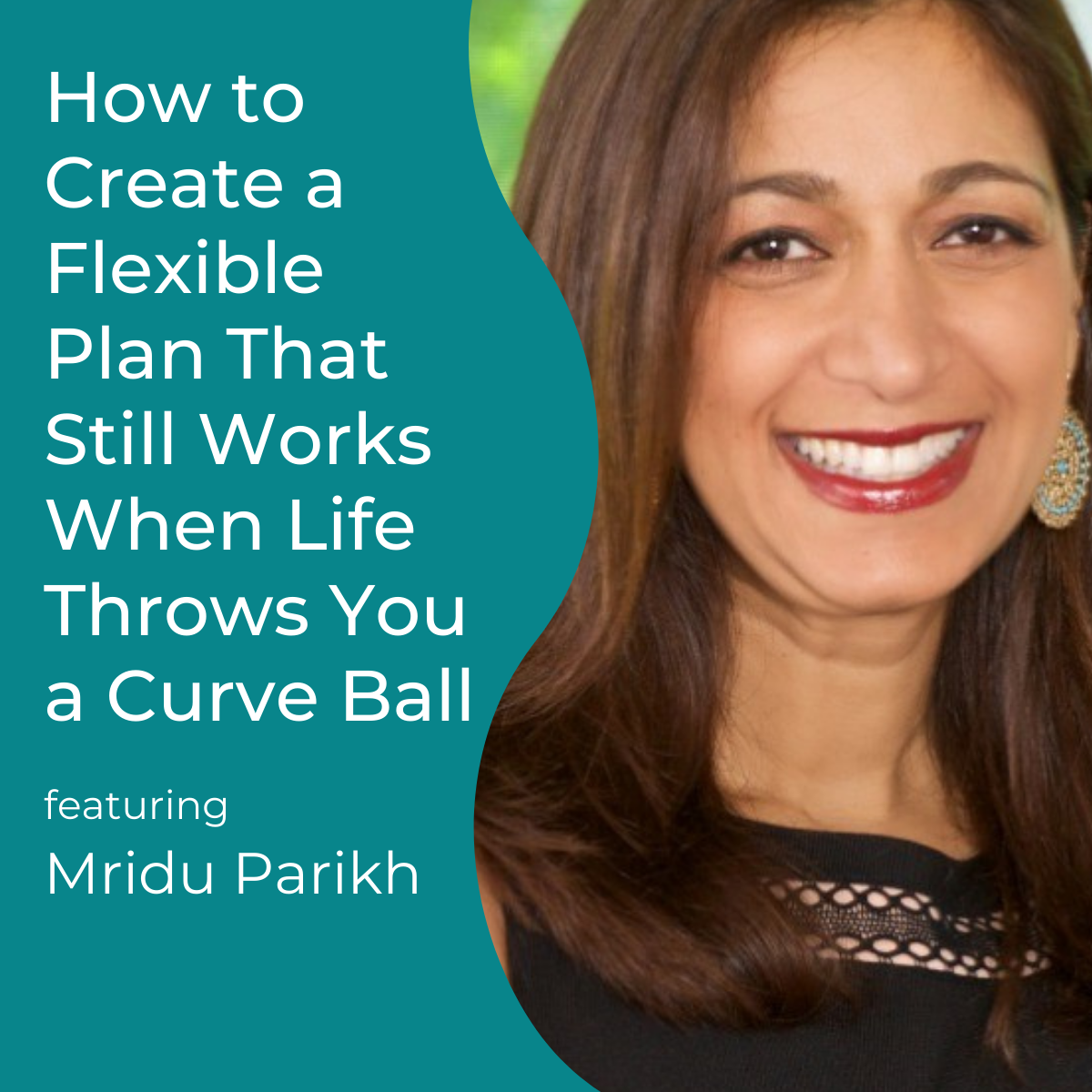One of the best things you can do to be productive is plan out your week. But what can you do when Murphy’s Law kicks in and throws your plan off?
Most people throw in the towel but I don’t want that to be you. That’s why my chat with Mridu Parikh, the Stress Squasher, is just what you need!
Shannon Baker
I am excited to be talking with another productivity expert and mompreneur in my community. And we’re going to be chatting today with Mridu Parikh. She has a podcast, Productivity on Purpose, which we were chatting before we started recording. And I just let her know her podcast is like one of the productivity podcasts I listen to to help me get outside of my own head. Because even though I talk about productivity, I need tips from another expert outside of myself as well. So she is one of those people that I go to when I need to make sure I keep myself on track. But before we jump into today’s topic, which we’re going to be talking about how to be strategic with our thinking, our time planning, and what to do when life just blows all of that up. So tell us a little bit about your background and your business and how you came to do what you do.
Mridu Parikh 01:04
Shannon, first of all, I’m so excited that we’re doing this I we were just saying how we have both been influencing each other and we could uh, we could really use another one of us in our lives. So I’m so excited that we’re gonna be sharing this with your audience today. So thanks for having me. I am Mridu Parikh. I am the founder of Life is Organized. I help multitasking mompreneurs wake up with a plan so they get controlled their demands and distractions at work. And at home. I’m on a mission to put the kibosh on your reactionary and do it all myself mentality. So women can focus on what really lights them up every day. I’m actually a former professional home organizer turned productivity pro. So I love to bring both the organization side and the productivity side into life right into your business and at home because y’all I think we all know that life is not integrated, right? It’s integrated, rather, it’s not compartmentalized. It totally meshes into one.
So when I started my business, as a home organizer, I was really focused on that on the systems in your home, with your meal planning, with, you know, billing everything in the home front. And over time, as I realized, as I was building my business, I’m a mom, I had two young kids, I was doing the home organizing, I myself was actually really falling behind I’d say, on my own goals in the sense, like, I was having a hard time prioritizing it all. I was feeling overwhelmed and scattered, although my home was organized.
There were other areas in my life that I felt like a little bit deficient. And so I started going on this personal journey of how do I get more focused? How do I find more time in my day for everything? How do I show up as like a good mom and a great business owner. And as I was going through that personal journey, and training and really delving into that productivity and time management world, I was also noticing the same struggles with my clients. Like they were sometimes struggling to get their organization completed because the same thing, they’re like, I just don’t have the time to do it. And so naturally, between what I was personally going through and what I was, what I was doing to my clients, my company, Life is Organized evolved from the home side to the productivity side. And now I really marry them both. So that’s what I get to do now.
Shannon Baker 03:35
I love it because you give some great tips. So usually when I’m listening to your episodes on my walk, I’m shaking my head like yep. I felt that. Experienced that. I’m going through that now. Thanks! This is what I needed. So like you said, life happens. The key to being successful is being able to merge our life in our business because we can’t compartmentalize the two. Like you said, what happens in one impacts the other. So with that being the case and like the women that you’ve worked with, what other than lack of time, have you seen holds them back from reaching their goals in their business?
Mridu Parikh 04:17
I think one of the number one things it’s funny you and I just just talked about this before we got on, is this lack of clarity. And what do I really want? And what’s truly most important to me, right? So here’s, here’s what I think most women do, because we are kind and we’re loving, and we think we know exactly what we want. So typically, if you ask women, what is it you really want out of life, they’d be like, I want to be really present for my family. I want to be really healthy. I want to grow a successful company, right? I want to feel like a great role model. And then they have those those goals and they’re kind of pretty universal, right? But then you kind of look at the way they’re spending their time where they’re putting their energy and it’s not really in alignment with those goals. Right, it’s not helping them show up as the best version of themselves at home, or in their work or as that role model or with their health, and where they’re spending their time is and sometimes in the weeds, and some of the minutia, just some of the nonsense, with the distractions, often responding and reacting to other people’s demands. So until we’re absolutely clear on what is it that I really, truly, truly want and get very connected, and I think like anchored in that it’s hard to really just move your life and systemize your life until you’re very clear on that. So that’s why I say first thing you’ve got to get crystal clear on was it what is it that you want? So then then we can start creating your life around that? Does that make sense?
Shannon Baker 05:02
Oh, absolutely. And that’s why, and I’m sure this is probably the same for you. The first thing I ask my client is why, like, why do you want to do this? Why now especially a business owner who’s been in business for years. Why are you deciding now that it’s the time for you to put systems in place because that goal of the why determines how you approach getting things done? So when it comes to time, we know that’s like critical to the strategy. Like even once you get that clarity, what’s the next step you would recommend someone do? It’s like, I’d identify the goal, like I was sharing with you, for me, it’s really focusing on niching down my branding even more as I move forward with my business. So when someone identifies what is their main focus, what would you recommend that they do next, to start to create a plan to make that happen?
Mridu Parikh 06:47
So typically, I’ll take my clients through a four step process. And the first is what we just talked about that goal and clarity. So I love this example, like, okay, I want to get really honed in on my branding, the second thing we would do is start creating this time in alignment on your schedule. So actually putting it pen to paper or on your digital calendar, When am I going to carve out that time? In theory, this sounds a lot easier than it typically is as well, like, oh, okay, easy, I know what I want to do. And I put on my calendar, except that when you get to your calendar, and you look at your to do list, you see your to do list is overflowing. There’s really not a lot of time left in your day between your work and your appointments and your family and your health and everything else. And now you’re struggling to fit it in.
So this requires some transition, some changes, some tweaks. Maybe you need to delegate something. You need to let go of something else. Maybe you need to reprioritize. You know, maybe we just need to take something else off and make room for this now and save something else that was a priority is going to, you know, I’ll be working on that next month. And so we actually want to create that time on your calendar. And then the third thing is to create some type of system or process around it, which I know is your jam. But I always say that if you do the first two steps, right, if you’re really clear on what you want, even if you put that time on your calendar, you shifted things around, you’ve made the space for it. If you don’t have a system around it, girl, we all know it’s gonna fall apart, right? And like a day or two days, maybe a week, you’ll stay consistent for a little bit and then it’s gone. Right? And that’s out the window.
So then we want to create some type of system and process around it, which again, will probably take some tweaking, like, Where do I need to do I create a system to get assistance with this? Do I just create a system around my environment, so it’s more conducive for me to get that goal done? Is there a checklist I want to create? Is there a workflow, you know, when we really systemize it. And then the last piece is creating some type of boundaries around all of that. So again, you can have your goal, if you get it on your calendar, you can create the system. But if you can’t put up the boundary to say that this is my time, or this is my commitment, or don’t disturb me during this, this time, then of course, it’s all going to fall apart again and you risk failure. So that’s kind of the framework that works for any goal, whether it’s in your work or your business, or your health or with your kids.
Shannon Baker 09:13
And I love it, especially the last one about boundaries. Anyone who listens to the show or follows me online knows I am big on boundaries. And I always say no is a complete sentence. Because if we don’t put those boundaries up, once we get that clarity, like you said, you can have the plan, but we’re gonna keep putting things in that space that’s supposed to be there for us to work towards our goal or work our plan, and it’s going to shift our priorities to things that are not going to move the needle forward in our business like we want. But now for those of us who may be a little bit more disciplined, we’ll create the plan, will put those boundaries in place. But then we know Murphy’s Law kicks in especially if you have kids or for me, it’s also older parents with doctor’s appointments. Like something always happens that throws that plan into like a spin. So, like, I know, Mridu both of us time block our schedules. But you could have the best schedule in the world, and then a kid gets sick or you get sick, whatever happens, throws off your day. So when that happens, and I love the tips that you share on your app, your podcast about this. How do you suggest we keep it flexible so that we can at least get something done? Even if it’s not everything on our plan.
Mridu Parikh 10:42
Yes, such a good question. Because we all know, just like you said, no matter how well you plan, something, or the other can throw, you know, the can throw it off, and it’s unforeseen. And no matter what boundaries you put up, something can happen and really put a wrench in it. So first of all, I’d say I think it’s the mindset that we go in with when we’re creating a plan. It’s really important when you’re creating it; and I absolutely believe that, you know, planning is the key to your success. So you make your daily plan, you get on your calendar, you time block, you’re still going in with it with a sense of this is fluid. And this is not a one and done, right? We don’t just like plan it in the morning, and then that’s it, see you later. See you in a week, my plan, right? It’s kind of my plan is open all day long on my laptop. And when something gets thrown off, it’s something that’s out of my control, right? That’s not within my boundaries. Then I’m not fretting immediately or throwing everything up in the air because I’ve already come into the thinking, you know what, this was a great stake in the ground, but there is a chance that something can change. And they can flow, right. And because it’s fluid, you’re more prepared to change with your plans.
So I do think first of all, we want to come in with that mindset that it’s not like a one and done, I’ve done my plan, I’m done. It’s more like, here’s a fluid roadmap for my day. Okay, so once that once you kind of come in with that, then when your plan gets really derailed, instead of starting that negative talk of oh my gosh, I can never stay on top of this or another, nothing ever goes my way or I’m not good enough for this. Instead, just step back for a moment, reassess, and reprioritize. And typically, there’s just a couple of questions you want to ask yourself. So let’s say you have, you know, maybe five different tasks on your plan for the day. They’re time blocked and something completely out of left field comes in, throws it off. And now you’re, you know, you’re an hour or two behind. Now go back to that plan, right? We’re not just gonna throw up our hands and say, I’m never not good at this. It’s never gonna work for me. Just go back to it and say, Okay, first of all, identify what got thrown off. Simply like, what did I get to. What got thrown off the plan? Okay, so very, very simple. Let’s just like take baby steps here.
Second, say okay, other things that got thrown off, what are the most important to accomplish today, like, literally, I can’t obviously can’t fit these all in, because I’m a couple hours behind. But before my head hits the pillow tonight, this must get done. Sometimes it’s something deadline driven. Sometimes it’s something that you’ve been procrastinating for a long time. And you’re like, this is what’s gonna make me feel most successful if I just nail this and get this out of the way. So it’s not like hanging over me all night, right? Maybe that’s it. Maybe it’s something that is just a key priority for you and you’re on a streak like you’re going to the gym or going for a walk. And it’s so important you don’t want to miss it. So you want to identify what is it that absolutely 100% must get done today, not just in terms of deadlines, but what makes me feel really, really accomplished and rewarded.
And then finally, when can I reschedule it again. Don’t throw up your hands and just say, Oh, it’s terrible at this. No, it’s just like shift things around. Maybe you can make time for it later in the day, it’s one of your top priorities. Maybe you shifted to the next day, Maybe through this process, because you’re short on time, another amazing benefit comes out of it and you recognize an opportunity for you to delegate that task. You’re like oh my gosh, I have no time it is important. I’m gonna have my assistant or my husband or my child or my mama or my marketing director, you know, someone else work on this for me. Another amazing benefit that can come out of it is that because you’re short on time, now, you simply become more efficient, right?
It’s like Parkinson’s Law, like the amount of time you have is the amount of time you’ll use. So sometimes even though I might have time blocked an hour for a particular task, like let’s say I want to write out my thoughts for my podcast that week, and things get all messed up in my plan and now I have only 25 minutes left in my day and in my timeframe. Then it’s amazing how I can get my thoughts out in 25 minutes I just because I’m under the gun and you can do it. So it is really amazing when you just have to step back and ask yourself these simple questions, how you can get back on track and more importantly, feel so good about what you got accomplished. Instead of like self deprecating.
Shannon Baker 15:05
Oh, yes, I love that. And one key I found that really helps to be able to basically kind of move the pegs around in your schedule like that is having whitespace. Like I did a whole episode on this. You have to put whitespace into your your schedule because it’s not efficient for you to have meetings back to back, to back, to back, to back and never give yourself a break, because then you’re worn out. But also like, you know, you mentioned if something happens, and you need to move things to another day, where will you move it if every day of the week is jam packed from the time you get up to the time you go to bed in the evening? Then you’re really frustrated! And that’s why most people give up on time blocking because they’re putting too much stuff in their schedule. It just is not realistic. Or you know, the word I try not to use is balanced, it just is not aligned. That’s a better word, not aligned with the type of life that we’re trying to create. So I love those things.
Mridu Parikh 16:04
Yeah, I totally agree. I think that’s where time blocking goes all wrong. That’s why it gets a bad name. Because you’ve are just over stuffing their schedules. I call it buffer time, but whitespace is the same, it’s just new. So if I think something’s gonna take me 15 minutes, I’ll put 30 minutes on my calendar, if I think it’s gonna take me 45 minutes, I’ll put 60 on the calendar, right? I’m always leaving buffer for exactly these things. Sometimes things take longer, sometimes things come out of nowhere. And but the best thing that happens to you and buffers, things take less time than you think. And you have this extra time. And that’s just like the best feeling!
Shannon Baker 16:37
Exactly! An easy way that I’ve learned how to do this on days that I take calls like Fridays, I do podcast recordings, or the other days, I have calls, my acuity scheduler is set to put a specific amount of time in between bookings, so that people can’t book appointments with me, like lined up back the back. And I didn’t do that at first. So I would have days where I’ll have like three podcast recordings in a row and wouldn’t have time to get up. And like even just do something as simple as stretching goes to the bathroom. But just crazy. Sitting there two hours just recording and talking. But speaking of tools, and systems, which is my jam, what systems do you use, to help you manage your time and be more strategic with your productivity?
Mridu Parikh 17:32
Well, I’m all about simplicity, I find anything that feels even slightly complicated or cumbersome, is going to shut me down, it’s going to paralyze me. And it basically I’m just not going to use it. So I’m like, what’s the simplest way to keep track of what I have to do when I have to get it done and to really motivate me to do it. So I use just really basically mostly two tools, maybe three, but one is Evernote, which if you’re not familiar with it is a list making app. There’s many different types of these, it’s not the be all end all, it’s just what I’ve used for a long time. So I use Evernote for kind of on my list and keeping track of everything in my life. And then I have my Google Calendar, where I’m really time blocking, setting goals, reverse engineering, thinking through my weeks doing all my planning is on that.
And then in terms of an actual another tool, everything’s mostly in my Google Drive, where I have sheets and docs and just everything’s really organized. But for the most part, I feel like if I can very effectively use which I do my Evernote and my Google Calendar, those two alone are like my life savers, to the point where if I didn’t have one or the other, I couldn’t get anything done. And so that’s how I know that I really come to rely on them and that they’re really working for me and not against me. So my advice would be don’t get caught up on the tool. definitely keep it simple, don’t overcomplicate this, just find something put a stake in the ground, maybe one list making app or tool that anything that you like, and then one calendar app and start that marriage between them.
Shannon Baker 19:03
And that is key. Finding what works for you because everyone has something that works for them. I see people who love Asana Asana mentally did not work for me. I love Trello because I can create the checklists, check them off, it hides the things which then eliminates the overwhelm for me mentally and I love that even the tools that you use, you can use them on the go on your mobile device or or even if you’re at your computer, which is really key because we’re not always at home so if we always have access to the information we can keep up with it. Unlike you know back in the day when if you wrote it on a post it note it was sitting on your desk or stuck to something at home and you’re not there where you can get access to it so electronic that you have access all the time definitely is key to helping with this process. So read through I have appreciated this conversation, I’ve been looking forward to it all weekend, it wasn’t going to be good. So before we wrap up, you have some amazing resources on your website. So tell everyone about that the resources you’re giving them access to.
Mridu Parikh 20:14
Shannon, thank you so much for sharing with your audience. So the best way for us to connect if you’d like what you’ve been hearing, you want to find out more is to come on over to Life is Organized, calm, and where you can get some free resources over at Life is Organized, comm forward slash resources. There are a few there, you can take your pick or get them all, but they’re about how to stop feeling overwhelmed how to finally stop procrastinating, and how to get and stay focused.
Shannon Baker 20:41
Yes, so in addition to that, and I’m going to drop a link to that in the show notes. You can listen to her podcast, which is productivity on purpose. It’s amazing. I love her episodes, her interviews, great conversations, so make sure you check that out. And then Are there any other places that they can connect with you online?
Mridu Parikh 21:03
I’m over on Instagram and Facebook. But I would say honestly, between the podcast and the website is probably where we’re going to get to know me best and where I can serve you best. So I think she had an IU we were both just talking about how we were in scaling back a little bit on social media to make room and prioritize. So for what’s really a better connection to a more meaningful for us and for our clients. So I’d say you know, podcast and website is probably the best bet.
Shannon Baker 21:33
Okay, great. And I’ll drop links again to both of those in the show notes. So thank you again for sharing these productivity tips with us today. I have again truly enjoyed the conversation. Great way to round out my week.
Mridu Parikh 21:46
Thanks so much.
To hear my chat with Linda listen to episode 90 of the podcast. Click below and tune in on your favorite platform.

Connect with Mridu Online
Grab Mridu’s productivity resources
Connect With Me Online
Follow Me On Instagram: @the_shannonbaker




